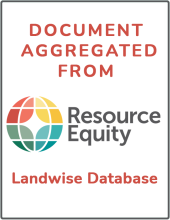Land Library Search
Through our robust search engine, you can search for any item of the over 73,000 highly curated resources in the Land Library.
If you would like to find an overview of what is possible, feel free to peruse the Search Guide.
/ library resources
Showing items 1 through 9 of 52.South African president Mbeki has characterised the developmental challenge in his country in terms of integrating the structurally disconnected ‘two economies’.
Today, many rural poor Filipinos are using state law to try to claim land rights. In spite of the availability of a much stronger set of legal resources than ever before, claiming legal land rights remains difficult.
This paper documents a participatory approach for supporting black South Africans in developing knowledge and skills to use land, acquired under the land reform scheme, more effectively.
Since 1994, the South African government has embarked on an ambitious land reform programme to redistribute and return land to previously disenfranchised communities. However, many black people lack the knowledge, skills and experience needed to manage their land.
Since the early 1990s, the dominant consensus in the debate on land rights reform in sub-Saharan Africa has been that external interventions to privatise land rights are usually inappropriate and likely to remain so.
This document investigates the concept of land reform in South Africa and argues that there is a need to redefine 'land reform' to take account of the realities of an urbanising, modernising, economy.
Effective and well-designed land reform policies can provide sustained contributions to economic growth, reduced social unrest and poverty. This study analyses land reform policies in Angola and South Africa with a view to assess its impact on food security.
This paper presents an analysis of the actions and omissions of the Guatemala State in respect to its obligations under the human right to food, and also refers to several paradigmatic cases of violations of the right to food within the context of the indigenous population and land and labour con



